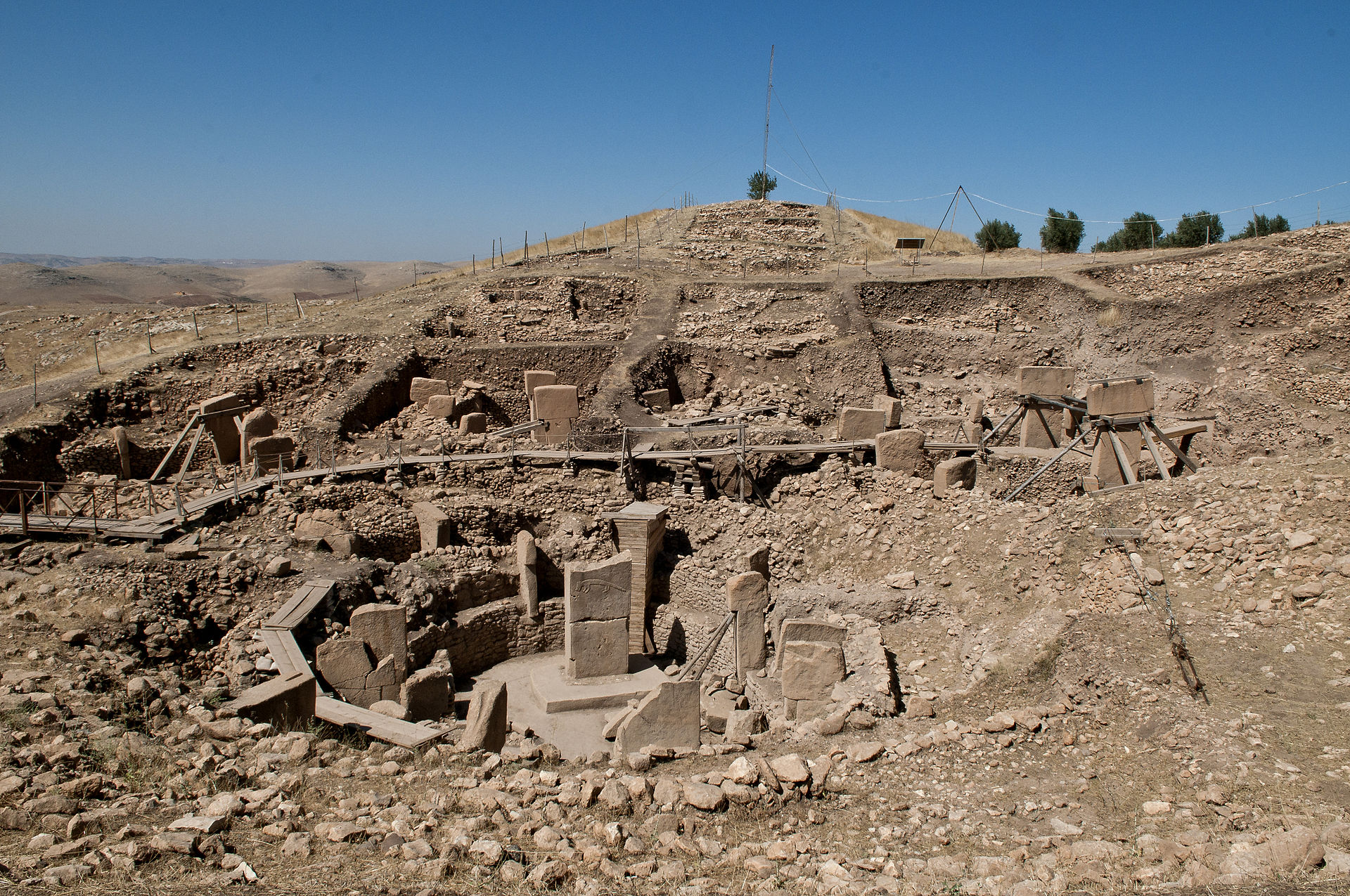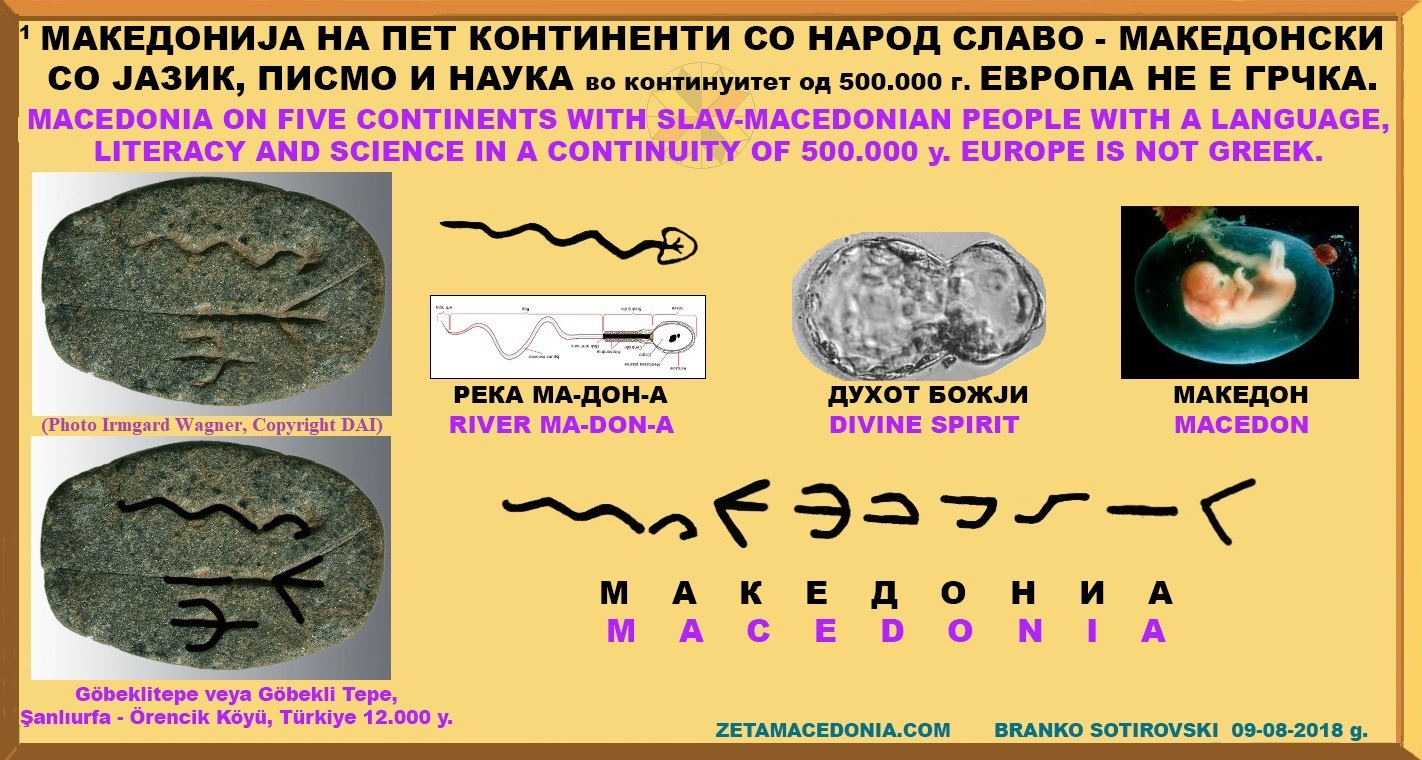09.08.2018
ZETA MACEDONIA – THE NEW
MACEDONIAN EMPIRE (BYZANTINE EMPIRE), NOWADAYS MODERN TURKEY
The Macedonian sanctuary Göbekli Tepe is one of the numerous sanctuaries from the Stone
Age of the Slav Macedonian era around 11.600 years ago. According to the
written evidence material, with the
BLOSSOM letter (Cyrillic and Latin), Slav Macedonian language, the faith of the
truth in the only God Sun ILI, the mother Maria, Madona, Virgin Mary,
Macedonia, the divine son Macedon, or simply with the science and the culture, we
can tell with certainty that the sanctuary Göbekli Tepe was built by the autochthonic
Slav Macedonian nation on the territory of Zeta Macedonia. This territory from
1299 to 1922 or a total of 624 years, was called as Ottoman Empire, after the
Macedonian dynasty of the Komnenos (the
father Etrogrul from the village Sultan kjoj, present-day Leskoec (Ohrid) and
the son Ottoman), and present-day Turkey named in 1922.
The sanctuary Göbekli Tepe is located six miles from Urfa,
ancient town in present-day southeast Turkey, and north Mesopotamia
(a Slav-Macedonian word Meso = Megju (Between) and Potamia = potochje = stream). It
considered that the sanctuary was built right around the same time that the
last ice age ended, but it had been abandoned under mysterious circumstances
around 9,000 years ago. The structures that make up the site are amazingly
well-preserved. Part of the reason for the remarkable preservation of Göbekli
Tepe is due to the climate in Zeta Macedonia, present-day Turkey.


The sanctuary Göbekli Tepe, 11.600 years. The territory of A map of the Slav Macedonian localities
Zeta Macedonia, The New Macedonian Empire (Byzantine Empire), in Mesopotamia (Megjupotochje)
Ottoman
Empire – Macedonian Dynasty, Modern Turkey (a Slav-Macedonian word Meso = Megju (Between)
and Potamia = potochje = stream)
The potentially world-changing discovery of Göbekli Tepe actually
first occurred back in the ‘60s, but nobody recognized its Slav Macedonian
character and significance at the time. In fact, it was wrongly assessed as
being a “medieval graveyard.”
But in 1994, it was “rediscovered” by Klaus Schmidt, a
German archaeologist, when Göbekli Tepe’s true significance and most impressive
traits - like its age, size, and construction quality was revealed. Most
archaeologists believe that Göbekli Tepe was intended to be some sort of
religious structure, although some also believe it may have been a burial site.
This makes Göbekli Tepe the world’s oldest temple. According to the newest deciphered
inscriptions, we can tell with certainty that the sanctuary Göbekli Tepe was built by the Slav Macedonians from the
period of Zeta Macedonia.
Many of the stones that make up the temples of Göbekli Tepe
have significant scientific, religious and artistic value as well. Most of the
central pillars are decorated with elaborate drawings of animals, and some even
have intricate animal statues carved right onto the pillar’s surface. The archeologist
Hodder was fascinated that Gobekli Tepe’s pillar carvings are dominated not by
edible prey like deer and cattle but by menacing creatures such as lions,
spiders, snakes and scorpions. These animals are personification of the deity
ILI and its characteristics.
In this sanctuary were found over 100.000 bone fragments, 60
percent of the total are gazelle bones, but also bones of other wild game such
as: boar; sheep and red deer, bones of a dozen different bird species,
including vultures, cranes, ducks and geese.

(Photo Irmgard Wagner, Copyright DAI).
The most striking finding is a small plaquette with engraved
symbols in a form of a ligature. From left to right is the symbol of Macedonia,
Madona, the river DON, which is presenting the divine semen, on this symbol is
written the word MA. The second symbol on the ligature is personification of
the Sun fertilizing sign and the divine son Macedon with hands up in the air.
On this symbol is written K, I, and A. The third ligature is symbolizing the
bird owl, a symbol of the death and the giving birth of a new life. On this
symbol-ligature is written E, D, O, N. Same or similar symbols could be found
in the wider region, which is proving the widespread autochthonic Slav
Macedonian nation.
On the stone plaquette is written: MAKEDONIA (MACEDONIA).
This plaquette is presenting Zeta Macedonia, as a source of the world’s science
and culture, the river MA-DON-A Macedonia, which is giving a birth to MACEDON
with the help of the DIVINE SPIRIT.